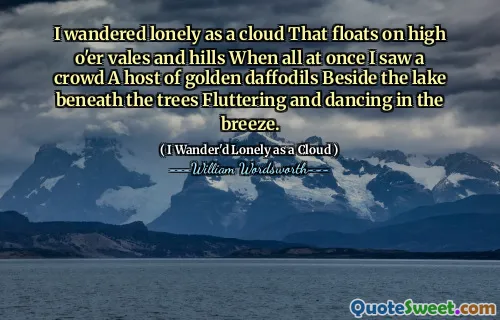"I Wander'd Lonely as a Cloud" is a famous poem by William Wordsworth, reflecting the beauty of nature and its profound emotional impact on the human spirit. In the poem, the speaker describes a moment of solitude while wandering through a natural landscape. He is inspired by a field of daffodils that dance in the wind, creating a striking image that uplifts his heart. This scene symbolizes the joy and vitality of nature, contrasting with feelings of loneliness that the speaker initially experiences.
The daffodils become a source of solace for the speaker. As he reflects on the memory of the flowers, he finds comfort and inspiration, demonstrating the power of nature to transform feelings of isolation into joy. The poem captures how moments spent in nature can have lasting effects on one’s emotional state, serving as a reminder of the beauty that exists in the world.
Ultimately, Wordsworth’s work emphasizes the interconnectedness between nature and human emotions. The poet suggests that taking time to appreciate the beauty of our surroundings can lead to a deeper sense of happiness and fulfillment. Through vivid imagery and personal reflection, "I Wander'd Lonely as a Cloud" remains a timeless celebration of nature’s ability to elevate the human spirit.
More »
Today Birthdays
1955 -
Max Lucado
1946 -
John Piper
1842 -
William James
1907 -
Abraham Joshua Heschel
1887 -
Aldo Leopold
1755 -
Alexander Hamilton
1976 -
Alethea Kontis
1971 -
Mary J. Blige
1825 -
Bayard Taylor
1943 -
Jim Hightower
1885 -
Alice Paul
1923 -
Carroll Shelby
1928 -
David L. Wolper
1954 -
Kailash Satyarthi
1972 -
Amanda Peet
1946 -
Naomi Judd
1970 -
Malcolm D. Lee
1955 -
Christian Marclay
1973 -
Rahul Dravid
1987 -
Jamie Vardy
1942 -
Clarence Clemons
1992 -
Fatima Sana Shaikh
1948 -
Larry Harvey
1930 -
Rod Taylor
